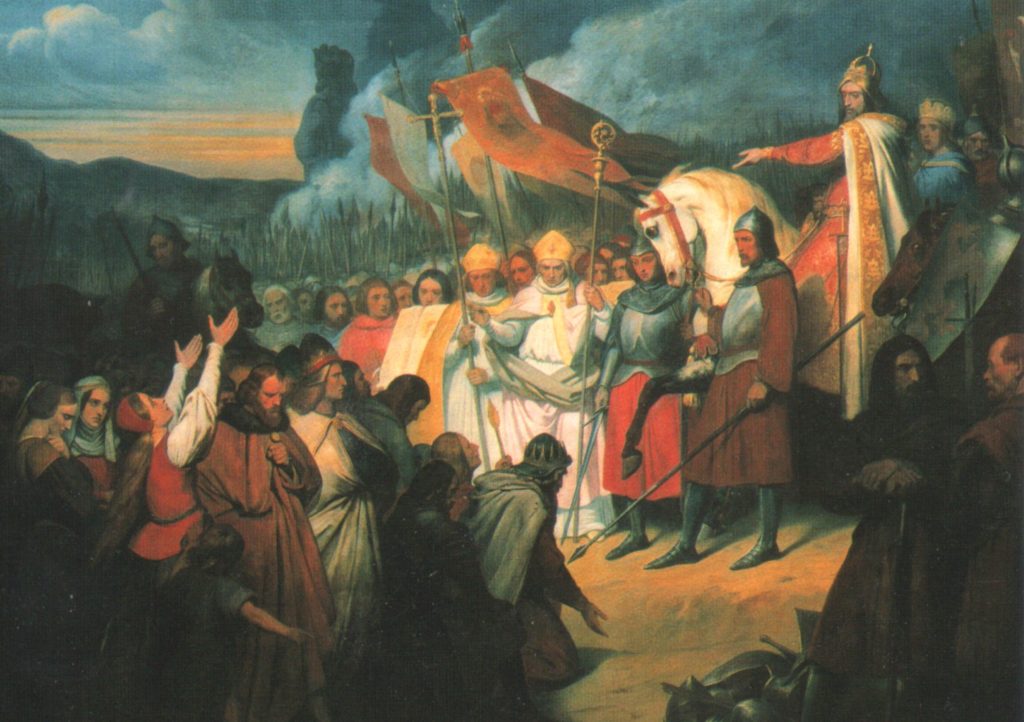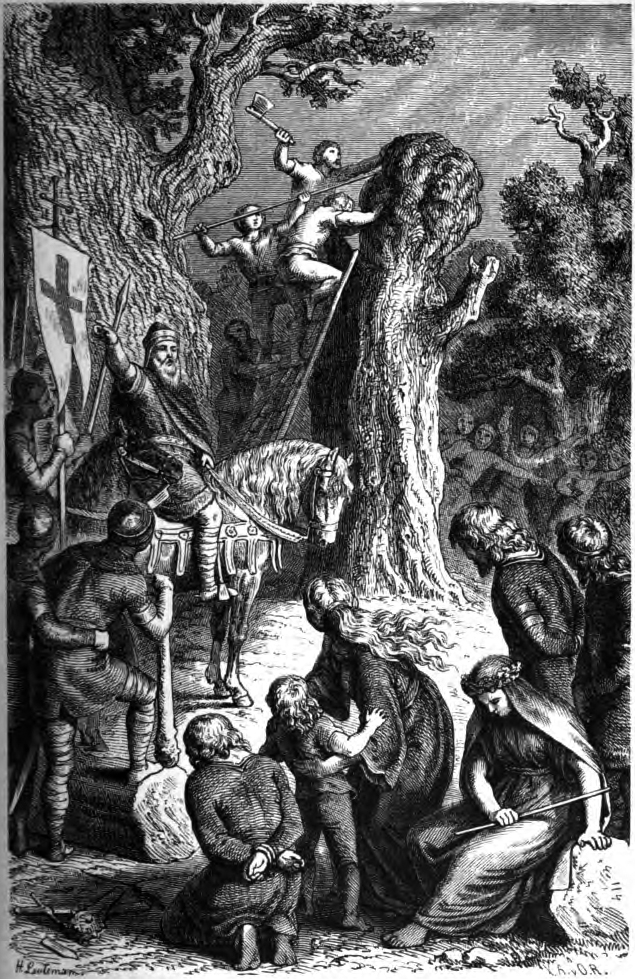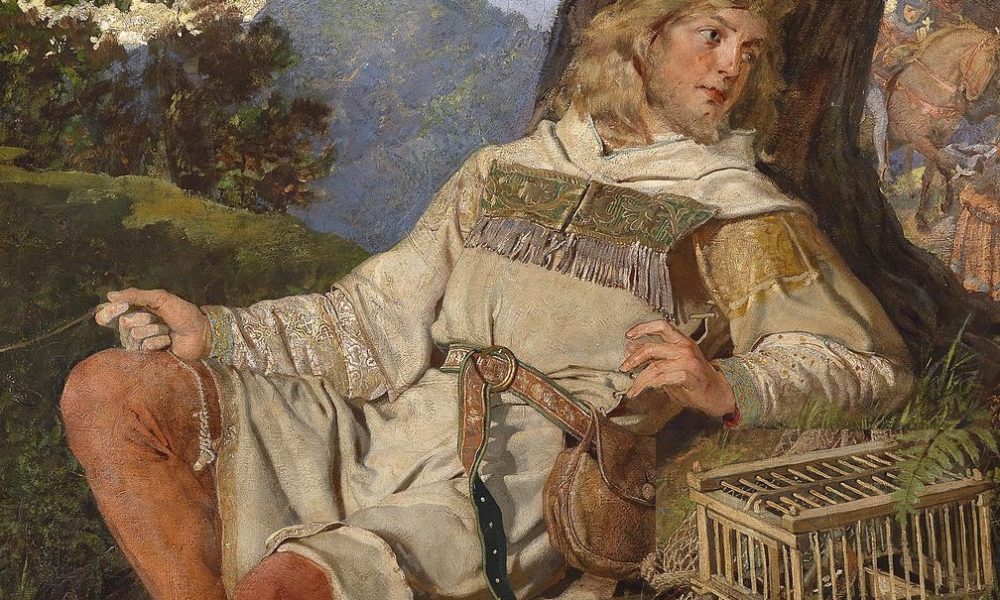
870 AD to 890 AD, Psalm 91: The Fowler.
This site was first built in French (see www.147thgeneration.net). The English translation was mainly done using « google translation ». We have tried to correct the result of this translation to avoid interpretation errors. However, it is likely that there are unsatisfactory translations, do not hesitate to communicate them to us for correction.
(for that click on this paragraph)
Summary
This generation is from the years 870 AD to 890 AD.
According to our count, this generation is the 91st generation associated with Psalm 91. It is in this Psalm 91 that we therefore find an illustration of the facts of this generation.
Whether on the side of the Umayyads of Cordoba or the Abbasid caliphate, which does not pursue its hostile policy towards minorities, the Jews live serenely in this generation. It is the same in the former Carolingian Empire where the Jews still enjoy royal protection.
The partition of the Carolingian Empire made it possible to reunite all of the German territories with Louis II. These territories are those who have given the greatest harm to Charlemagne in his conquests, especially those of the Saxons. The Saxons were pagans, and every conversion to Christianity was often only facade.
Charlemagne, who had compared himself to King David, and made of Aix La Chapelle the new Jerusalem, thought he could suppress paganism in German lands by importing and imposing Christianity. In fact the victory is only apparent, paganism remains rooted in the German heritage, it will awaken in the form of German romanticism in the nineteenth century bringing Germany to Nazism and Europe and part of the world to chaos.
It is to the present generation that born the one who will create the first German dynasty: Henry 1st the Fowler.
The “pacification” of Germany by the Carolingians and the rise of new towns often developed from ancient Roman positions attracted many Jews who settled there being seduced by a certain freedom and favorable economic conditions.
However, just as the bird-catcher attracts the birds by attracting them to seemingly safe and nutritious places, the Jews are trapped in these new territories. The trap will close several times. Each time, the Jews will come back, suffer massacres and disappear. Then the time doing its work, forgetting the past setbacks, new generations will settle in turn to suffer the same fate. And that until modern times.
The psalm of this generation is unfortunately lucid about this dark future despite the relative calm of this generation for the Jews.
Talk
Break
On the Umayyad side of Cordoba, Muhammad I continued his reign (852-886), then succeeded him Al Mundhir (886-888) and Abd Allah (888-912). While waiting for the golden age of Judaism in the Umayyad Caliphate of Cordoba, it seems that Jews live serene in Islamic Spain during this generation. In any case, history has not retained any negative event for this community and this generation.
For this generation, the Abbassid Caliphate is provided by al Mutamid (870-892). The policy of Al Mutawakkil hostile towards minorities and Jews in particular does not seem to be renewed by his successors. As in the Umayyad Caliphate, it seems that for this generation, the Jews live serenely within the Abbasid empire. This generation is associated with the beginning of the bursting of the Abbasid empire.
On the side of the former Carolingian empire, the Jews still enjoy the royal protection, the recurrent attacks of clergy cadres remaining without significant effect, at least for the Jews of this generation.
It seems that the Ethan prayer (see previous generations) has been heard, and that the Jewish people can breathe during this generation.
The psalm of this generation is not signed, but seems to be in continuity with the psalm of the previous generation. Moses could well be the author of this new psalm which at first sight looks like a blessing, since it is only a promise of protection.
This blessing is adapted to the present generation, which is likely for all communities in the Christian or Muslim world an opportunity to strengthen in terms of demographic and economic. We know that the rest of history is not rosy and that the Jews will still have to go through many painful experiences within nations.
In fact, if Moses speaks of the fate of men in the previous psalm. Here he no longer addresses a plurality of individuals but a singular subject.
In the same way, considering the tense used, it does not evoke the present but the future. As a result, what seems to be a blessing is in fact addressed only to the Jewish people as a whole and is an evocation of events that will affect them in the generations to come.
In evoking the fragility of life in the previous psalm, it is easier in the present psalm to evoke the only blessing that matters: the survival of the people of Israel.
This is evoked by the psalm of this generation that promises the people of Israel and not every Jew to go through the night except. Thus the beginning of the psalm recalls the protective role of God towards his people:

- He who dwells in the covert of the Most High will lodge in the shadow of the Almighty.
- I shall say of the Lord [that He is] my shelter and my fortress, my God in Whom I trust.
Saxons
The Treaty of Verdun [1] in 843 signed the end of the Carolingian Empire shared between the three sons of Louis the Pious. This division made it possible to reunite on behalf of Louis II all the German territories. These territories are those who have given the greatest harm to Charlemagne in his conquests, especially those of the Saxons.
The Saxons were pagans, and every conversion to Christianity was often only facade:
- The essential [2] of the conquering actions of Charlemagne lies on the northern and eastern borders of Germany. A first threat was the still pagan Saxons. On several occasions, the Saxons had pretended to recognize the authority of the Franks and then resumed their independence. Their attacks had resumed under Pepin Le Bref (the Short), who had managed to contain them. As early as 772, Charlemagne began a first campaign against them, which led him to Lower Weser, where he built the fort at Ehresburg. He ordered the destruction of the Saxon idol, the Irmensul or Erminsäule, a gigantic tree trunk in the middle of a sacred grove where the god Odin was venerated. […]
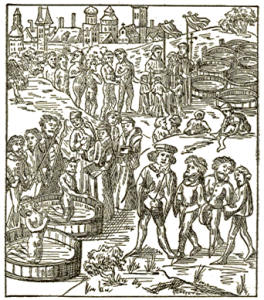
- (in 775) Charlemagne (in a new campaign) reappeared in, Saxon country. Facing the Franks, Duke Widukind organized the resistance. Penetrating into the heart of Saxony, Charlemagne obtained the submission of some Saxon chiefs. Several thousand Saxons converted at a collective baptism at Paderborn in 777, but Widukind continued the struggle until 785. During this long confrontation the Franks proceeded to a policy of terror. One of the most cruel episodes was the killing of four thousand five hundred Saxon hostages in Verden in 782. […] It was not until after thirty years and after eight military campaigns that Charlemagne had finally reached submit the Saxon country.
Charlemagne’s failure
Charlemagne compared himself to King David and made Aix La Chapelle the new Jerusalem. He thought he could suppress paganism in German lands by importing and imposing Christianity there.
In fact the victory is only apparent, paganism remains rooted in the German heritage, it will awaken in the form of German romanticism in the nineteenth century bringing Germany to Nazism and Europe and part of the world to chaos.
The anchoring of paganism is real among the German people:
- The mass [3] of men lives in Charlemagne’s Germany in a primitive and miserable way, in ignorance and superstition. […] In their isolation, their ignorance, their misery and their terrors, men do not know much about the world around them, beyond their clearing and their forest, and even less of the historical worlds that preceded them. Their collective memory, however, retains, in the form of tales, legends and songs, the memory of distant gestures mingled with the tribulations of the ancient gods and demi-gods. But these remembrances are often and victoriously defeated by the servants of Christianity, who substitute the sacred history of the people of Israel for the pagan stories of the Germans of old. Gradually, very slowly, a Christian morality is superimposed on the Germanic morals. Without ceasing, throughout the high Middle Ages, synods, mandates, and sermons fight what in the people (that is to say, in all classes and layers), still belongs to the ancient culture, which will be repressed, denied, driven out of the conscious and historical, without being totally eliminated, as shown by the reappearance of old Nordic legends and memories of great migrations in the songs of gesture that are written towards the end of the 12th century and the beginning of the thirteenth century, seven, eight centuries after the events of which they keep the traces.
But it is at this time, that which flows from the present generation, that the exactions towards the Jews will succeed one another in German land, all will serve as pretext to attack the Jews: Crusades, Plague ….
Perhaps because of what they represent the religion that has been imposed on them at the expense of their ancestral pagan beliefs.
Henry 1st the Fowler
It is to the present generation, in 876 that is born the one who will create the first German dynasty: Henry 1st the Fowler.
At the death of the young king Louis the Child in 911, rather than choosing a Carolingian ruler, the Germans designated in 911 one of theirs: Conrad. The date 911 is one of the dates used as the date of birth of Germany. Before dying, Conrad named his successor the Duke of Saxony: the future Henry 1st the Fowler:
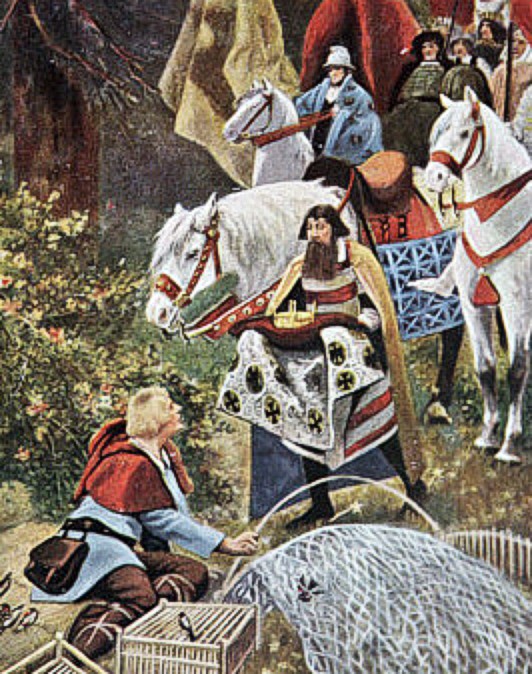
- When [4] Conrad’s envoys arrived near the Duke of Saxony, he, according to the tradition reported by the chroniclers, was setting traps for the birds. This was what made him go down in history under the name of Henry the Fowler. Thus it was the Duke of Saxony who was chosen to reign over the eastern part of Charlemagne’s inheritance. Revenge of the Saxons once fought and humiliated by Charlemagne! With Henry of Saxony, indeed, it was a distant descendant of Widukind, whose grandfather Ludolf, had received the ducal distinction from the hands of Louis the Germanic to fight the Viking invaders, who became king of Germania. […] To stand out from the Frankish tradition, the new King Henry I (919-936) refused to receive the spiritual investiture of Archbishop Heringer of Mainz, which earned him the title of « unscrupulous king ». « .
Also:
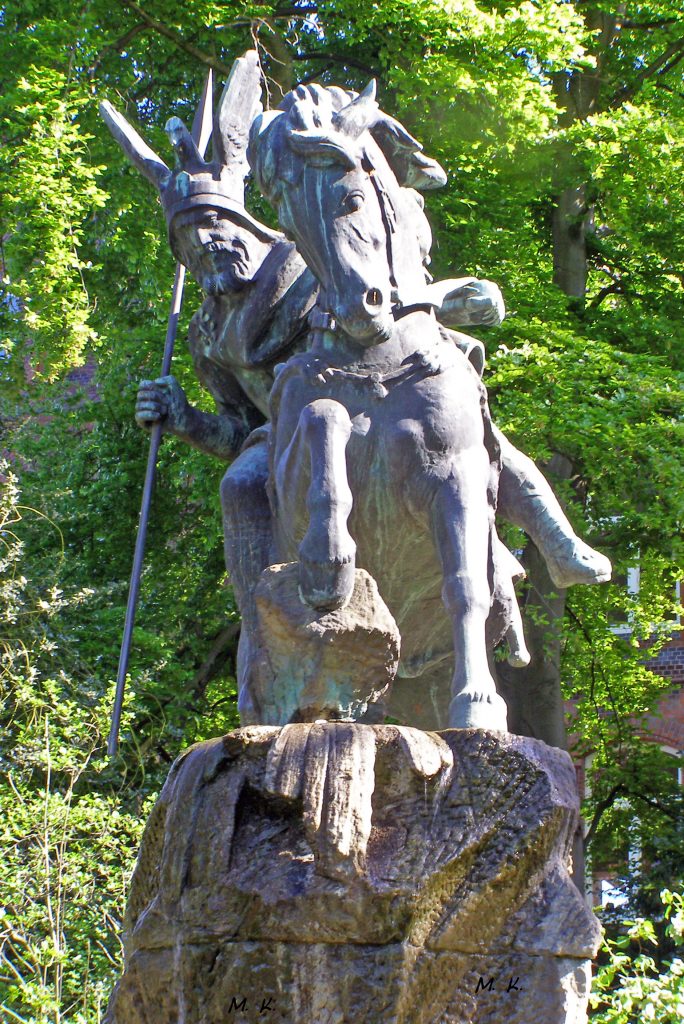
- The other [5] significant aspect of the Saxon’s accession to royalty is, precisely, that he is a Saxon, and descends from Widukind, the pagan hero of the Saxon struggle against Charlemagne. This is another decisive proof of the strength of the brand new German unit.
- Henry I the Fowler founded the first German dynasty through his son Otto I, first Germanic emperor, and is involved in the outbreak of the Capetian dynasty since he is the grandfather of Hugh Capet.
The trap
The « pacification » of Germany by the Carolingians and the rise of new towns often developed from ancient Roman positions attracted many Jews who settled there being seduced by a certain freedom and favorable economic conditions.
However, just as the bird-catcher attracts the birds by attracting them to seemingly safe and nutritious places, the Jews are trapped in these new territories. The trap will close several times.
Each time, the Jews will come back, suffer massacres and disappear. Then the time doing its work, forgetting the past setbacks, new generations will settle in turn to suffer the same fate. And that until modern times.
Thus the continuation of the Psalm indicates the dangers against which the people of Israel will face, leaving « feathers » each time but not succumbing (as a people). In fact these dangers that are evoked will be far from sparing the Jews, but miraculously, if every generation of the night is going to be entitled to its share of tears, the Jewish people will always remain alive, while each of its enemies, after having bruised the Jewish people will not survive the test of time.This is indicated by the following of the psalm:

- Surely He (The Lord) will save you from the fowler’s snare …
- Alluding to Henry I the Oiseleur who is born to this generation the psalmist indicates geographically where the danger of the next generations lies: in German lands and also in French lands which will be in a certain dependence on the German sphere.
- … and from the deadly pestilence.
- With His wing He will cover you, and under His wings you will take refuge; His truth is an encompassing shield.
- You will not fear the fright of night, the arrow that flies by day;
- Pestilence that prowls in darkness, destruction that ravages at noon.
- The murderous plague will not spare the Jews, it will even strike them doubly. A first time directly, a second time, when after the epidemic, the survivors will take revenge on the Jews accused of having spread it. The trap of the fowler is the comparison that can be made with the generations who will suffer the effects of the Crusades, the plague and other massacres perpetrated in Europe, not to mention the trap that will close on the Jews Iberian. Unfortunately, many more generations of Jews will still be caught in the trap.
- A thousand will be stationed at your side, and ten thousand at your right hand; but it will not approach you.
- Whatever the lot paid by each generation, the Jewish people will cross, being safe, the nations.
- You will but gaze with your eyes, and you will see the annihilation of the wicked.
- Each of Israel’s enemies will eventually perish or disappear, the people of Israel will survive him to see his downfall.
Dark future
Moses, taking advantage of the apparent lull for the Jews of this generation, recites a blessing-like psalm contrasting with what the Jews will experience in future generations. All the evils cited in this psalm, in fact, will befall the Jews. Not in this generation, but in the next, according to the time used in the psalm. This contradiction is only apparent.
In fact, when the Jews inherited the promised land, they failed to manage their « happiness » and moved away from God gradually.
The nation of Israel has been designated by God as a nation of priests, to play the role of God’s witness to the nations. In fact, the misfortunes that have struck them since the countdown to the night began, since the death of Solomon, have but one overall goal: to strengthen the covenant between God and His people who, in the face of adversity, because of its « stiff neck » is much more determined to affirm its fidelity to God than in opulence and quietude.
Through this strengthened fidelity and through the exile of the night, the Jewish people become a divine messenger to the nations and thereby directly or indirectly strengthen the knowledge and recognition of God with the peoples of the earth.
Thus this psalm becomes much clearer if we refer to the testament speech of Moses in Deuteronomy which presents strong parallels with the present psalm:
- When [6]the Most High gave nations their lot, when He separated the sons of man, He set up the boundaries of peoples according to the number of the children of Israel.
- Because the Lord’s portion is His people Jacob, the lot of His inheritance.
- He found them in a desert land, and in a desolate, howling wasteland. He encompassed them and bestowed understanding upon them; He protected them as the pupil of His eye.
- As an eagle awakens its nest, hovering over its fledglings, it spreads its wings, taking them and carrying them on its pinions.
- [So] the Lord guided them alone, and there was no alien deity with Him.
- He made them ride upon the high places of the earth, that they would eat the produce of the field. He let them suck honey from a rock, and oil from the mighty part of the crag.
- The cream of cattle and the milk of sheep, with the fat of lambs and rams of Bashan and he goats, with kidneys of wheat, and it [the congregation of Israel] would drink the blood of grapes [which was] as the finest wine.
- And Jeshurun became fat and rebelled; you grew fat, thick and rotund; [Israel] forsook the God Who made them, and spurned the [Mighty] Rock of their salvation.
- They provoked His zeal with alien worship; they made Him angry with abominations deeds.
- They sacrificed to demons, which have no power, deities they did not know, new things that only recently came, which your forefathers did not fear.
- You forgot the [Mighty] Rock Who bore you; you forgot the God Who delivered you.
- And the Lord saw this and became angry, provoked by His sons and daughters.
- And He said, « I will hide My face from them. I will see what their end will be, for they are a generation of changes; they are not [recognizable] as My children whom I have reared.
- They have provoked My jealousy with a non god, provoked My anger with their vanities. Thus, I will provoke their jealousy with a non people, provoke their anger with a foolish nation.
- For a fire blazed in My wrath, and burned to the lowest depths. It consumed the land and its produce, setting aflame the foundations of mountains.
- I will link evils upon them. I will use up My arrows on them.
- They will sprout hair from famine, attacked by demons, excised by Meriri. I will incite the teeth of livestock upon them, with the venom of creatures that slither in the dust.
- From outside, the sword will bereave, and terror from within; young men and maidens, suckling babes with venerable elders.
- I said that I would make an end of them, eradicate their remembrance from mankind.
- Were it not that the enemy’s wrath was heaped up, lest their adversaries distort; lest they claim, « Our hand was triumphant! The Lord did none of this! »
- For they are a nation devoid of counsel, and they have no understanding.
- If they were wise, they would understand this; they would reflect upon their fate.
- How can one [person] pursue a thousand, and two put ten thousand to flight, unless their [Mighty] Rock has sold them out, and the Lord has given them over?
- For their rock is not like our [Mighty] Rock. Nevertheless, our enemies sit in judgment.
- For their vine is of the vine of Sodom, and of the field of Gomorrah; their grapes are grapes of rosh, and they have bitter clusters.
- Their wine is the bitterness of serpents, and the bitterness of the ruthless cobras.
- Is it not stored up with Me, sealed up in My treasuries?
- Vengeance is poised with Me, and it will pay at the time their foot stumbles. For the appointed day of their reckoning is near, and what is destined for them hastens.
- When the Lord will judge His people, and will reconsider His servants, when He sees that the power is increasing, and none is controlled or strengthened.
- Then He will say, « Where is their deity, the rock in which they trusted,
- who ate the fat of their sacrifices and drank the wine of their libations? Let them arise and help you! Let them be your shelter!
- See now that it is I! I am the One, and there is no god like Me! I cause death and grant life. I strike, but I heal, and no one can rescue from My Hand!
- For I raise up My hand to heaven, and say, ‘As I live forever.’
- When I sharpen the blade of My sword, and My hand grasps judgment, I will bring vengeance upon My adversaries and repay those who hate Me.
- I will intoxicate My arrows with blood, and My sword will consume flesh, from the blood of the slain and the captives, from the first breach of the enemy.’
- Sing out praise, O you nations, for His people! For He will avenge the blood of His servants, inflict revenge upon His adversaries, and appease His land [and] His people.
It is in the light of this prediction of Moses that we must understand the conclusion of the psalm. This end does not deny the misfortunes that will be borne by the Jewish people in future generations, but this « distress » is only a temporary passage that must lead it to the final redemption and its recognition by nations:

- For you [said], « The Lord is my refuge »; the Most High you made your dwelling.
- No harm will befall you, nor will a plague draw near to your tent.
- For He will command His angels on your behalf to guard you in all your ways.
- On [their] hands they will bear you, lest your foot stumble on a stone.
- On a young lion and a cobra you will tread; you will trample the young lion and the serpent.
- For he yearns for Me, and I shall rescue him; I shall fortify him because he knows My name.
- He will call Me and I shall answer him; I am with him in distress; I shall rescue him and I shall honor him.
- With length of days I shall satiate him, and I shall show him My salvation.

[1] Henry Bogdan: « History of Germany ». (French: « Histoire de l’Allemagne ». (p. 55/56) )
[2] Henry Bogdan: « History of Germany ». (French: « Histoire de l’Allemagne ». (p. 50/51) )
[3] Joseph Rovan: « History of Germany ». (French: « Histoire de l’Allemagne ». (p. 67) )
[4] Henry Bogdan: « History of Germany ». (French: « Histoire de l’Allemagne ». (p. 59/60) )
[5] Joseph Rovan: « History of Germany ». (French: « Histoire de l’Allemagne ». (p. 89) )
[6] Devarim – Deuteronomy – Chapter 32,verses 8 to 43.

